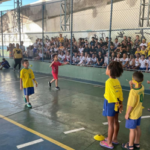Teacher: Marina Mantovani Rodrigues de Castro

Marina Mantovani Rodrigues de Castro
Marina holds a Bachelor’s degree in Biology from the University of Porto (Portugal) and the Federal University of Mato Grosso, where she also completed her Master’s degree in Social Anthropology. Her professional endeavours include research and the formulation of anthropological reports within Quilombola communities affected by agribusiness and the construction of hydroelectric power stations. Currently, she serves as an educator, teaching science and coordinating socio-environmental projects within the Ensina Brasil program.
Usefull links related to the Solution
Overview
Marina and Mariana taught in a school in an urban area of Vitória in the state of Espírito Santo. Many of the students there live in poverty, there is a lack of basic amenities such as water and basic sanitation, and drug trafficking and violence regularly occur in the local community. With so many socio-economic problems surrounding them, the students and parents had become disconnected from nature and unable to see how education in general could positively impact the students’ lives. This project aimed to tackle these issues by introducing new sustainably focused habits to the students’ routines and by bringing the community together to bring about positive change in the local community.
Theory of Change
As a science teacher, Marina understood that the science curriculum covered only the very basic science concepts involved in climate change education. She and Mariana set out to show their students the links between nature, sustainability and climate change; and to ensure that they not only educated the families of the students involved in the project but also changed their attitudes to be engaged and supportive of the students’ learning.
Approach and Actions
Marina and Mariana were asked by the Director of Orlandina D’Almeida Lucas School to lead a project that focused on sustainability. This led them to recruit 15 students, aged 11-15, to join a sustainability-focused extracurricular club. These students were already interested in the topic of sustainability but had little knowledge of the concept.
The students in the club then carried out a survey and interviews of students and staff in the school to find out the background level of understanding of climate change and sustainability. At the same time, Marina and Mariana also started to discuss sustainability topics with the students in the club, increasing their knowledge and understanding. This led to the students then disseminating this information to their peers and to students in lower years.
After two months of discussion, the students put in place 14 recycling points around the school grounds, enabling different types of waste to be collected. The club also worked with staff, especially the cleaning staff, to ensure that waste was collected appropriately. An agreement was reached with the local government which supported the initiative by arranging the collection of different recycling materials and sending them to the appropriate processing organisations. The students also planted and maintained a garden, which was designed to connect the students to nature.
A selection of community outreach activities were also implemented which took the form of games. These were popular and successfully engaged the families of the students leading to families being more supportive of the learning of the students in general.
Impact
The project ran for two years and in that time the recycling initiative was very successful with students regularly separating their waste responsibly. Some students even started implementing recycling systems in their own homes. Through one community outreach activity, the school also managed to collect 150 kg of plastic for recycling, this shows the change in attitude that occurred in the wider school community including parents and staff.
Marina and Mariana are also proud that they observed, through discussion with students that through the project, many students had developed an understanding of the connection between nature and climate change. The students also felt they could make a difference to issues they were encountering even if only at a local level.







